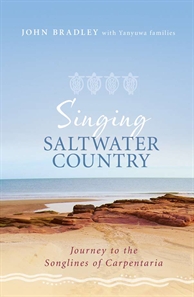John Bradley’s compelling account of three decades living with the Yanyuwa people of the Gulf of Carpentaria and of how the elders revealed to him the ancient songlines of their Dreaming.
At twenty John Bradley was sent to teach Aboriginal children in a school at remote Borroloola, on the Gulf of Carpentaria in far north Australia.
But it is the teacher who is educated by the Yanyuwa elders and their families. Over three decades he learns their language and their country, becoming intimately drawn into other ways of being, both practical and spiritual. With passion and pride they teach him their songlines, relating what they know and value – ancestors, kin, allegiances; places, plants, animals; seasons, ceremonies, stories – and the spirit that sustains all.
As we follow John Bradley on his journey, we begin to see that the songlines are keys to the authority and continuity held by Aboriginal Law. We begin to understand why, when country can no longer be sung, the Yanyuwa feel it so deeply. And what such loss means to us all.
‘A rare diary of devotion .. sometimes humorous, sometimes very sad, revealing the extraordinary personal commitment needed to gain insight into Aboriginal connections to country… a moving tale of an urgent quest.’ – Professor Jon Altman, Australian National University
‘This book strikes chords with the work of William Stanner and Donald Thomson, while evoking the poetic resonance of Barry Lopez’s writing about the Inuit.’ – Dr Nonie Sharp, author of Saltwater People
‘A rare book that attunes us to ways of Yanyuwa dwelling, belonging and being in an intimate relatedness that does not separate thinking from feeling, history from experience, authority from caring, solemnity from humour, and meaning from the life in which this knowledge is embedded.’ – Dr Franca Tamisari, Ca’ Foscari University of Venice and University of Queensland
Awards
Shortlisted, 2011 Colin Roderick Award
Shortlisted, 2011 QLD Premier’s Literary Awards, Non-fiction Book Award
 Singing Saltwater Country
Singing Saltwater Country
I read this book and it should be recommended on reading lists for all anthropology students non-indigenous and indigenous Or indeed anyone interested in Aboriginal culture and how government policies have affected the First Australians.